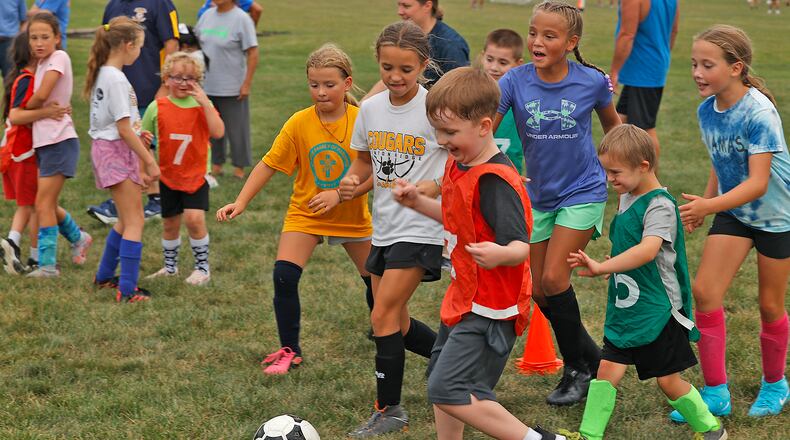“Parents write a note or email about how their family looks forward to Dream Soccer all year,” said Bonita Heeg, leader of Springfield Rotary’s services to people with developmental disabilities. “It’s a wonderful window for opportunity for these families and it’s a nice opportunity for the families of kids with developmental disabilities to interact and converse.”
This free program is for those ages 5 to young adult with physical, intellectual or developmental disabilities. They are organized into teams based on ability and size.
Teams had practices on Tuesday and Thursday nights for two weeks, before the tournament on Friday with three games and an awards ceremony.
This year, the program had 55 participants, which is about the average each year, Heeg said.
Credit: Bill Lackey
Credit: Bill Lackey
Heeg said Rotarians contribute financially and volunteer each year, as well as coaches and team members from Springfield Thunder.
“The Rotarians look forward to this every year ... They bond with the children or teens and they find it so enriching. Particularly because of the bonding it provides them and they see the good that’s not only happening for the player but the good that’s happening to them, which is the unexpected part,” Heeg said. “It’s really heartwarming and it’s very fulfilling for the Rotarian participation.”
The program started 20 years ago, but this year was only the 18th event because of the COVID pandemic, which led to cancellations in 2020 and 2021.
The idea for the event started after Springfield Thunder Soccer parent coach Tony Cooper saw kids having fun and wondered why those with disabilities didn’t get the same opportunity.
He reached out to Kathy Duffin, who is still involved with the Clark County Special Olympics, to get something started. She then reached out to Springfield Rotary, because back then “they had over 80 years of experience with children with developmental disabilities.”
Heeg explained this program is really important because it helps the participants socially, physically, mentally and emotionally.
“Because even though there are strides made, there are still limited opportunities for people with developmental disabilities, particularly for children, teens and young adults. And soccer provides an opportunity to learn, participate and play where there would not be another opportunity available to them because of their disabilities,” she said.
Credit: Bill Lackey
Credit: Bill Lackey
About the Author



